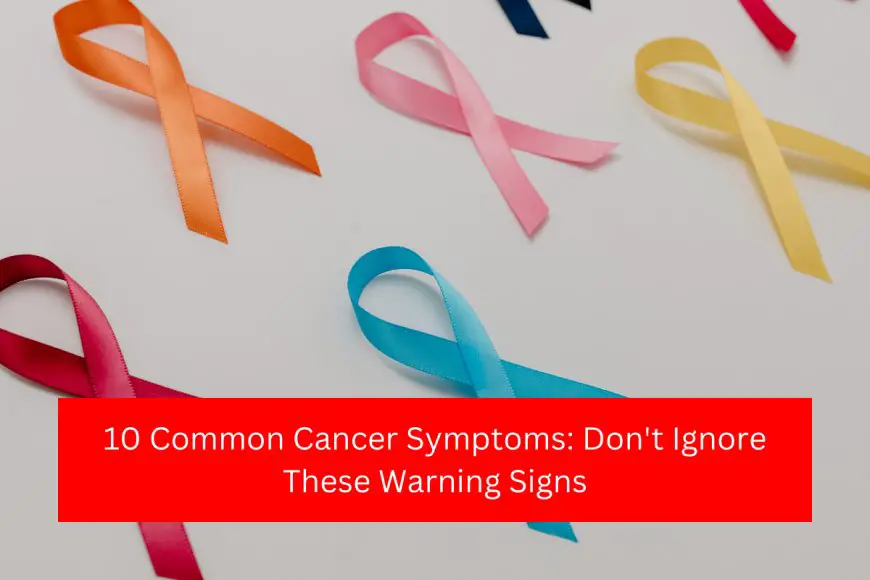10 Common Cancer Symptoms: Don't Ignore These Warning Signs
Learn about 10 common cancer symptoms you shouldn't ignore. Early detection is crucial in fighting cancer. This blog post provides information to help you recognize potential signs and emphasizes consulting a doctor for proper diagnosis.

Cancer is a complex disease characterized by uncontrolled cell growth. While there are many different types of cancer, some warning signs often appear across various forms. Early detection is crucial for successful treatment, so it's important to be aware of these common cancer symptoms.
This blog post is for informational purposes only and should not be a substitute for professional medical advice. If you experience any of these symptoms, it's vital to consult a doctor for proper diagnosis and treatment.
1. Unexplained Weight Loss
Sudden or significant weight loss without trying can be a red flag. Cancer cells can burn more energy than normal cells, leading to unintended weight loss. This symptom is often associated with cancers of the esophagus, lung, stomach, pancreas, or ovaries.
2. Lumps or Areas of Thickening
Lumps or bumps anywhere on the body, particularly in the breast, lymph nodes, testicles, or abdomen, warrant a doctor's visit. While not all lumps are cancerous, it's important to get them checked. Pay attention to changes in size, texture, or tenderness of existing lumps.
3. Changes in Bowel or Bladder Habits
Changes in your bowel habits, such as constipation, diarrhea, or blood in the stool, can be signs of colon cancer or rectal cancer. Similarly, experiencing difficulty urinating, blood in the urine, or frequent urination can be indicative of bladder cancer or prostate cancer.
4. Persistent Bleeding or Discharge
Unusual bleeding or discharge from any body opening, such as rectal bleeding, vaginal bleeding between periods, or bloody nipple discharge, can be a cause for concern. These symptoms can be associated with various cancers, including uterine cancer, cervical cancer, and colorectal cancer.
5. Persistent Cough or Difficulty Breathing
A cough that doesn't go away, especially one that worsens over time, or coughing up blood can be a sign of lung cancer. Difficulty breathing, wheezing, or persistent chest pain can also be associated with lung cancer or other cancers that spread to the lungs.
6. Changes in Skin
Changes in the size, shape, or color of moles should be examined by a doctor. New moles, persistent sores that don't heal, or yellowing of the skin and eyes can be signs of skin cancer.
7. Difficulty Swallowing
Having trouble swallowing food or liquids can be a symptom of esophageal cancer, throat cancer, or stomach cancer. Persistent heartburn or indigestion that doesn't respond to medication can also be a warning sign.
8. Unexplained Fever or Night Sweats
While fever and night sweats can be caused by various illnesses, persistent unexplained fevers or night sweats can be a sign of cancer, particularly leukemia or lymphoma.
9. Fatigue and Weakness
Feeling excessively tired or weak for no apparent reason can be a symptom of many cancers, including leukemia, lymphoma, and colon cancer. This fatigue often doesn't improve with rest and can significantly impact daily activities.
10. Chronic Pain
Unexplained pain that persists for a long time, especially bone pain or pain that worsens at night, can be a symptom of some cancers, such as bone cancer or cancers that have spread to the bones.
Important Considerations
It's important to remember that these are just some common cancer symptoms, and experiencing one or two of them doesn't necessarily mean you have cancer. Many of these symptoms can be caused by other, less serious conditions.
However, if you experience any of these symptoms persistently, it's crucial to schedule an appointment with your doctor for a proper diagnosis. Early detection is essential for successful cancer treatment.
Disclaimer
This blog post is intended for informational purposes only and does not constitute medical advice. Please consult with a qualified healthcare professional for diagnosis and treatment of any medical condition.
The information in this blog post is based on well-established medical resources, including the Mayo Clinic, MD Anderson Cancer Center, and WebMD. We strive to provide accurate and up-to-date information.








